
Sleep is the cornerstone for good health and the best free performance enhancing drug. We all know the difference that a solid night’s sleep has on our energy levels, mood, and willpower throughout the day.
And while we don’t need science to grok the importance of sleep, there is a vast scientific body highlighting the key role that sleep plays in brain function, hormone regulation, immune system and overall longevity.
The brain undergoes vital processes during sleep that reset and restore its functions. Even short-term sleep loss significantly reduces cognitive abilities and makes us more prone to catching colds.

But as we age, achieving quality sleep becomes more challenging due to physiological changes. The body’s circadian rhythm that regulates sleep-wake cycles weakens which leads to fragmented sleep and earlier wake times. Declining melatonin production, a hormone crucial for sleep onset, further exacerbates this issue.
The modern world has also brought about an increase in stress and electronic devices that further disrupts sleep. Stress activates the sympathetic nervous system which raises cortisol and adrenaline, and keeps the brain in a heightened state. And our phones and laptops emit blue light that suppresses melatonin while the hours that we spend on social media overstimulates the brain.
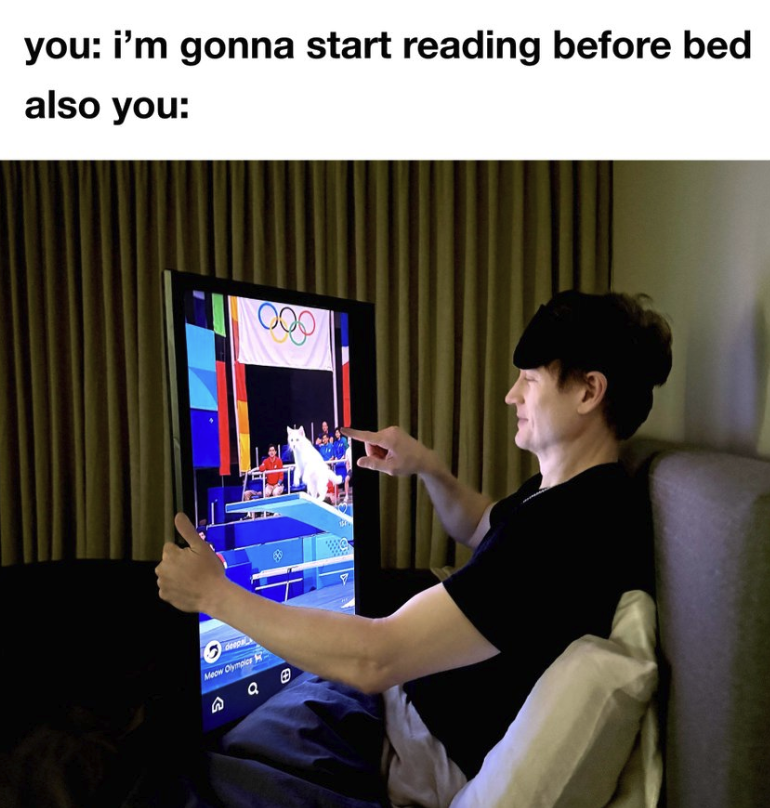
It’s for these reasons (and many others) that longevity obsessed Bryan Johnson has become one of the biggest sleep advocates. Recognizing sleep’s critical role in health and performance, he devoted months perfecting every aspect of his sleep routine to achieve a perfect sleep score.
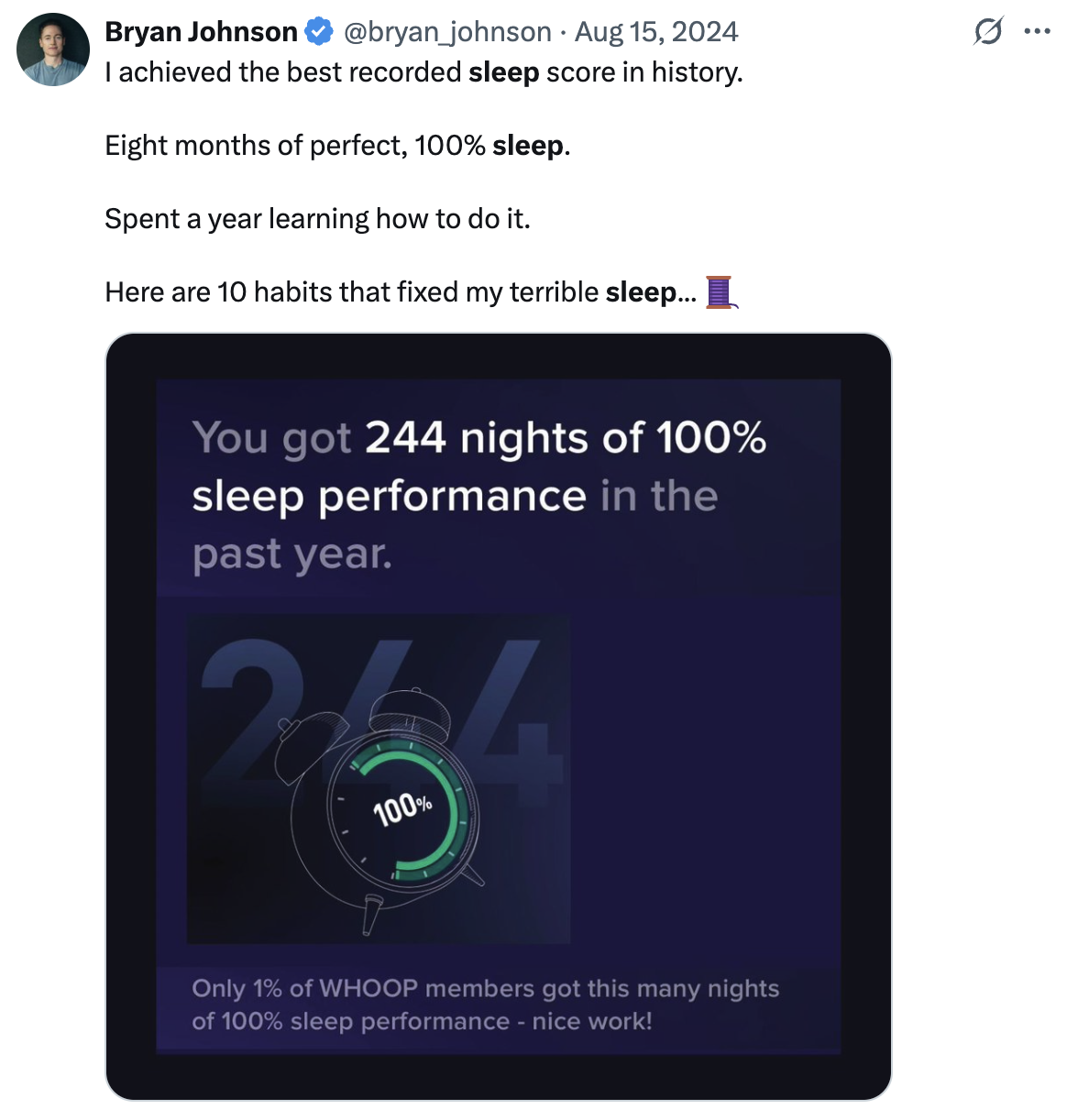
Improving the quality of your sleep is one of the best investments that you can make. To help you consistently achieve the scientifically optimal 7-9 hours of sleep per night, I have compiled Bryan Johnson's entire sleep routine.
Note that becoming a sleep professional like Bryan Johnson will take time and effort. Just like building any other habit, it will require devotion and discipline. The key is to experiment with different approaches until you discover the optimal sleep strategy for you.

Bryan Johnson has reframed his identity as a professional sleeper. This means that he has made sleep his main priority. He plans his day around sleep and he does not allow anything to interfere with it. Discipline equals great sleep.
While everyone has different bed times, it’s crucial to stick to a time that is optimal for you. Make sure that your bed time enables you to consistently get 7-9 hours of sleep. And stay consistent during weekends or it will become harder to build this habit. To quote Bryan, “You’re on time for work meetings, be on time for your bedtime.”
Try to keep your sleep environment solely for sleeping and not for work or recreational habits like watching tv. You want to create a strong association between your bedroom and sleep. Besides that, keep your room as dark as possible. And if environmental sounds are an issue, try using earplugs.
60 minutes before sleep, begin the process of winding down. Try to calm the mind down by either reading, journaling, meditating, breathing, or listening to music. For some people it also helps to take a warm bath before bed. The goal is to prime the mind for sleep.
1 hour of scrolling your phone in bed increases your insomnia risk by 59%. It also shortens sleep by 24 minutes on average. Blue light also suppresses melatonin secretion and can disrupt your circadian rhythm. Enable night mode on all devices or install blue light filters. The same goes for your Netflix account, stay away one hour before sleep.

While this is less likely to be relevant for those in a relationship, Bryan considers it to be one of the best habits to improve sleep. To quote him directly, “Yes I sleep solo. If you can it’s possibly one of the best things you can do to improve sleep. But note that there is some evidence that some people do better sleeping with others.”
For optimal sleep, try to maintain a bedroom temperature between 19-21°C (66-70°F) to achieve a skin surface temperature of 31-35°C (88-95°F). This aligns with European recommendations to keep bedroom temperatures around 18-20°C.
For those of you that can afford it, consider regulating bed surface temperature with a temperature controlled mattress like Eight Sleep. The Eight Sleep mattress is priced between $3,000 to $4,500 USD and features a top layer with water-flow channels for on-demand cooling or heating.
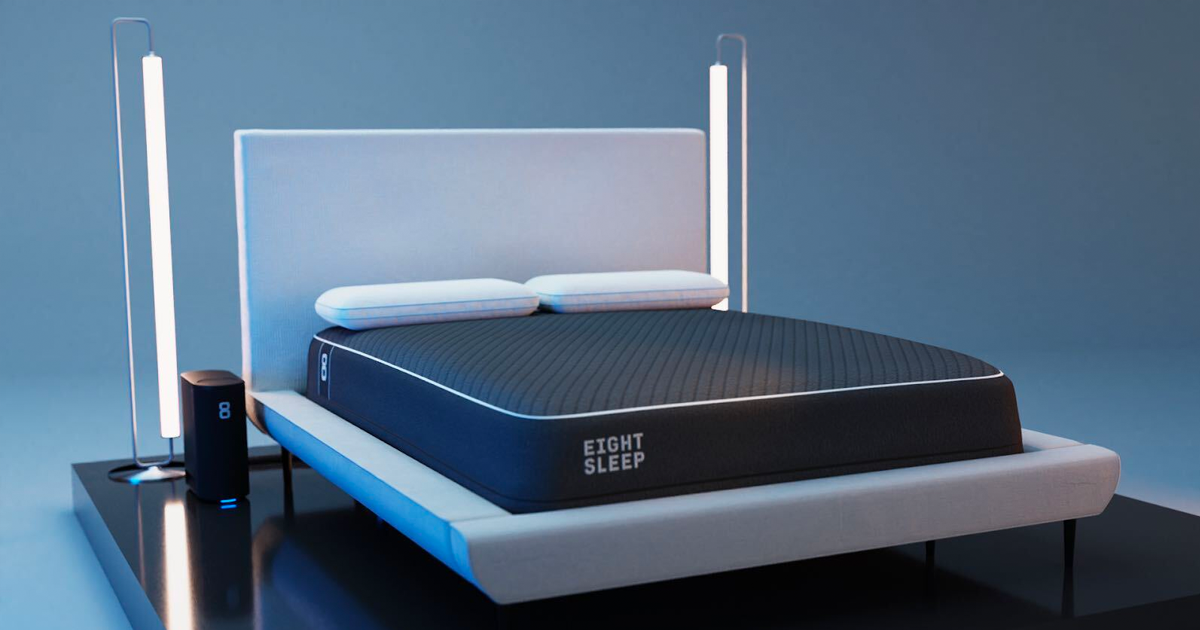
Each side can be adjusted between 12°C (55°F) and 43°C (110°F) so that each person can tailor the temperature accordingto their needs. This is the mattress that Bryan Johnson uses and swears by.
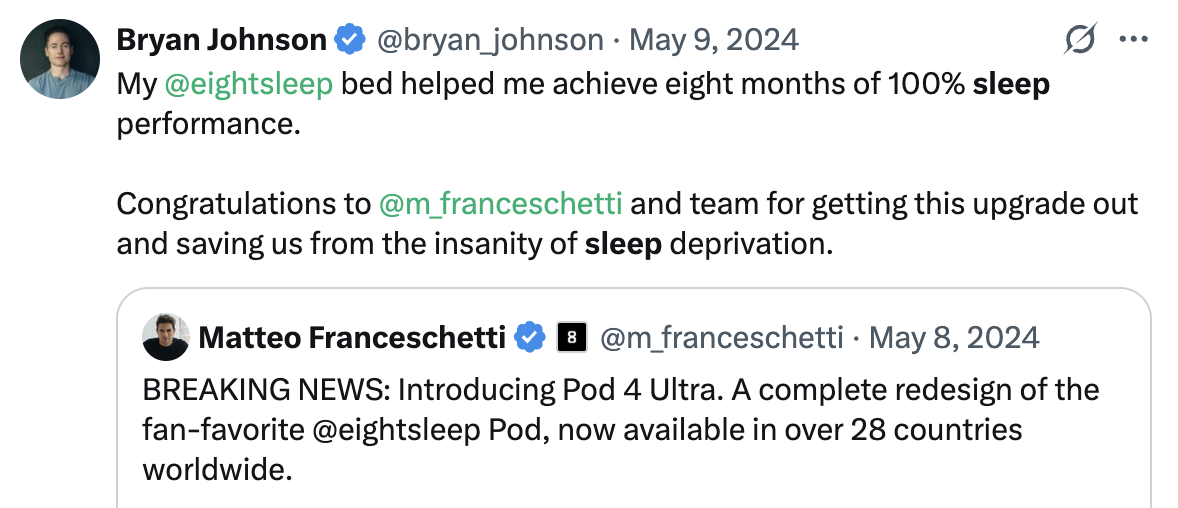
Eating close to bedtime puts high metabolic demands on the body. It disrupts melatonin production and interferes with the body’s ability to lower the core temperature. This spikes blood glucose and insulin which elevates heart rate.
Studies have shown that even a small pre-bed snack can reduce slow-wave sleep by up to 27%. Bryan recommends eating your biggest meal in the middle of the day to facilitate reaching your lowest resting heart rate (RHR) before bedtime. Bryan wrote on X that if he eats an additional 500 calories during the day, his sleep RHR will increase by 10-15%.

Caffeine raises resting heart rate (RHR) by stimulating the central nervous system and increasing adrenaline release. The half-life of caffeine in adults is around 6 hours. This means that if a person drinks a cup of coffee containing 100 mg of caffeine six hours before bedtime, about 50 mg of caffeine remains active in their system at bedtime. Besides caffeine, avoid other stimulants (including alcohol) before bed as they also disrupt sleep.
High-intensity exercise such as running or weightlifting activates the sympathetic nervous system which elevates heart rate, adrenaline, and cortisol levels. These elevated levels can persist for hours which is why it’s better to avoid intense workouts close to bedtime. According to Bryan, resting heart rate before bed is the number 1 best indicator of how well you will sleep.
Bryan Johnson measured the blood flow to and from his brain using ultrasound in various sleeping positions. His left side had the best blood flow followed by his right side. His left side experienced the best blood flow, followed by the right side. The back was third in terms of circulation, and the stomach resulted in the worst flow.
These findings align with traditional sleeping wisdom that recommends the left side as the best position for restful and healthy sleep. Bryan also uses an ergonomic pillow and a smaller pillow between his knees to support proper sleep posture.
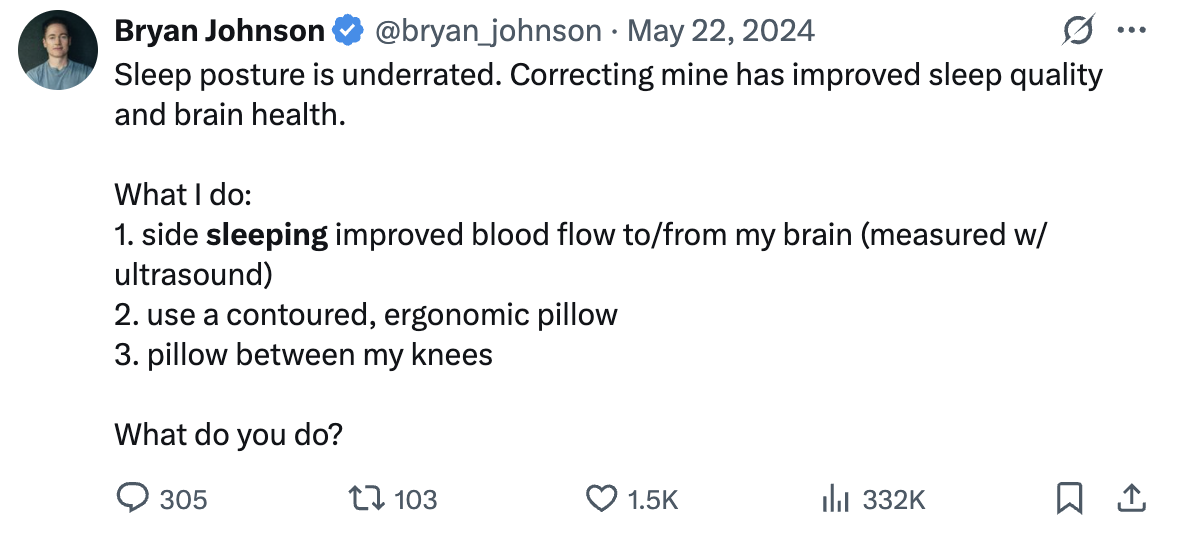
The best way to keep track of your sleeping patterns and metrics is to buy a device like Apple Watch or Fitbit. For those that want more sophisticated data, you can sign up to a monthly Whoop subscription like Bryan. Tracking metrics such as heart rate variability (HRV), body temperature, respiration rate, REM sleep, and deep sleep provides a comprehensive view of overall sleep quality and recovery. As the saying goes, you’ll improve what you measure.

Several supplements have demonstrated potential benefits for improving sleep quality.
Magnesium supports relaxation by calming the nervous system and regulating neurotransmitters that promote sleep. It also aids with muscle relaxation and reduces restless leg symptoms.
Glycine is an amino acid that helps lower the body's core temperature, which signals to the body that it’s time to sleep. Glycine also boosts relaxation which helps get a deeper more restful sleep.
Supplementing vitamin D has shown to improve sleep quality by modulating melatonin synthesis and supporting brain regions involved in sleep regulation.
Ashwagandha is a natural herb that reduces stress and anxiety, helping you relax before bed. It lowers cortisol levels, which can disrupt sleep.
Other supplements such as zinc, L-theanine, and herbal extracts like valerian, chamomile, and passionflower also show promise by reducing anxiety.